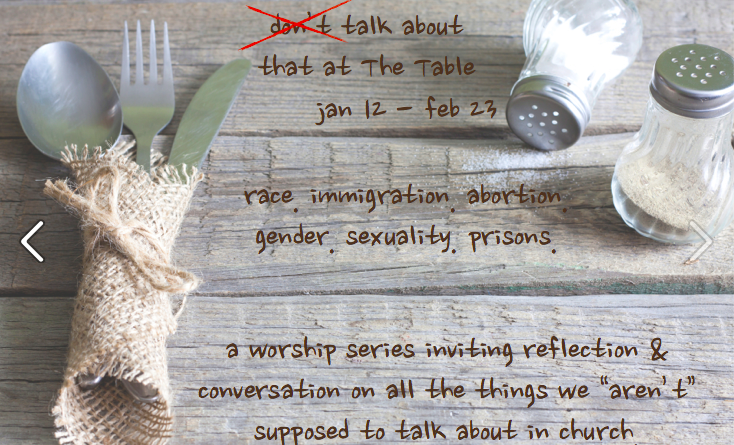We move into the first topic of our new worship series this Sunday called Don’t Talk About That at The Table. Our worship series will invite reflection & conversation on many of the topics we “aren’t” supposed to talk about in church. This week we will consider Race.
The outline of our current series:
January 12: United Methodist Social Principles (Acts 10.34-43)
January 19: Race (Matthew 5.38-48)
January 26: Immigration (1 Corinthians 1.10-18)
February 2: Abortion (Micah 6.1-8)
February 9: Gender (Ephesians 5.22-24 & Galatians 3.28)
February 16: Sexuality (Romans 1.26-27 & Ruth 1.16-17)
February 23: Prisons (Hebrews 13.3)
Our passage this week is unique to the Gospel of Matthew and comes as part of the Sermon on the Mount in which Jesus addresses the Hebraic understanding of the Law which instructed followers to “love your neighbor as yourself” (Lev. 19.18). At the time the definition of “neighbor” included only your “kin” or “fellow Israelite.” This instruction from Jesus “makes love of God and neighbor the fundamental command on which all else depends, and makes the command to love enemies specific and concrete…The command should not be understood abstractly, “love all people, including even enemies.” In Jesus’ situation it referred particularly to the occupying Roman forces, and thus to national enemies as well as to competing religious groups and personal enemies. (compiled from NIB vol 8 pp 193-198) The commands outlined (turn your other cheek, go the second mile, give to those who beg and borrow) are only possible if we are rooted in Grace, growing in faith and reaching in love on a regular basis. “You can’t give what you don’t have, and so only those who have experience love can in turn share it with others.” (David Lose, Working Preacher)
The question should not be “What would Jesus do?” but rather, more dangerously, “What would Jesus have me do?” The onus is not on Jesus but on us, for Jesus did not come to ask semidivine human beings to do impossible things. He came to ask human beings to live up to their full humanity; he wants us to live in the full implication of our human gifts, and that is far more demanding. (Peter J. Gomes, The Scandalous Gospel of Jesus, 2007)
When have you found it easy to love your neighbor? When have you found it difficult? What relationship, if any, are you able to draw between the regular practice of your faith and your ability to love your neighbor?


0 Comments